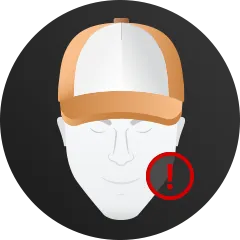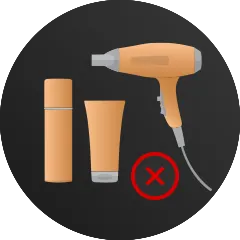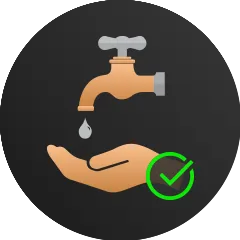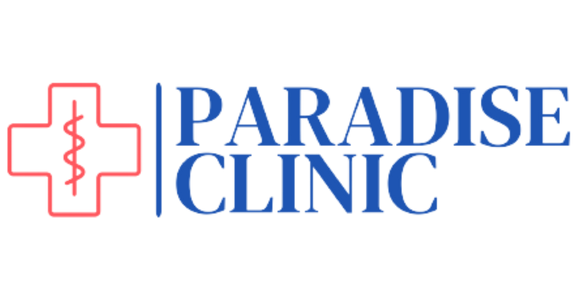Hair Transplant Recovery Time
Once your hair transplant procedure is complete and you leave our clinic, you will still have access to our full post- hair transplant aftercare program and expert guidance any time you need it.
From this stage, it can 2-3 months before your new follicles fully take and begin to naturally grow new hair.
Your new hair growth may be rough and uneven at first, but you will soon be growing back the youthful head of hair you deserve.
Most patients reach full natural hair growth by around 10 months after their procedure.
Please note that every patient’s results and recovery times are different.
If your hair re-growth is taking longer it does not mean that the procedure hasn’t worked or that your results won’t be as effective.
However, as always, if you have any concerns whatsoever you can call us or request a complimentary checkup as part of our aftercare promise.
1-4 Days
The Healing Period Post Hair Transplant
It is crucial that you follow the aftercare steps set out by your surgeons closely.
More information can also be found on our aftercare page.
When you are first discharged post hair transplant, you will be given a Head Quarters aftercare bag to take home containing everything you need, including a spray bottle of saline.
You will need to spray your scalp with this regularly in order to speed up the healing of the follicles, protect against infection to the incisions and prevent scabbing.
Tips for spraying the transplanted and donor areas:
Use your left hand to spray your left side and the right hand to spray the right side.
Ask a family member or friend to spray for you if it’s more convenient.
Once you’ve completed the 12 hours of spraying you should sleep for a few hours.
It is also very important that you rest as much as possible in the first few days after your hair transplant.
This is not only because the procedure tires your body out, but because resting helps speed up your recovery.
There are certain things that should be avoided during these few days as they provide a risk post hair transplant, such as swimming, drinking alcohol, smoking, high-impact exercise and more.
It is also crucial you keep your scalp well hydrated during this period with regular saline sprays.
If you need to comb your hair be sure to do so carefully while it is soaking wet to avoid causing any bleeding or irritation.
Luckily our aftercare team will be available at all times so you won’t be left in the dark if you have any queries or concerns at any point during the recovery process.
Any precautions that need to be taken after your hair transplant will be made clear to you.
5-9 Days
Recovery & Rest Is Crucial After A Procedure
At around 5 days post hair transplant, your scalp should be healed enough that you can begin to gently wash it again.
At this stage, the soreness and swelling that appeared after the transplant should have mostly disappeared.
However, you should still avoid shampoo at this stage and focus on gently removing any dried skin or scabs.
Even though most of the healing is done at this stage, we would still recommend avoiding any high impact exercise at this point after your hair transplant, just to be absolutely sure all follicles are healed before you get going again.
10-14 Days
Returning to Your Haircare Routine
At this point, your scalp will likely appear pink and scabbed.
This typically only lasts around 10-14 days but in the case of people with pale skin, it can stick around for longer.
As long as there is no pain or discomfort this is nothing to worry about.
Once the pink skin and scabs have fully healed, your follicles will go dormant again and all of your new hair will fall out, making you look like you did before the hair transplant even began.
This is all part of the process and will eventually lead to your transplanted follicles sprouting rich, healthy new hairs.
At this stage, you are able to begin washing your hair again as normal.
A question we commonly get asked is what the best shampoo to use after a hair transplant might be.
As long as your usual shampoo isn’t particularly rough or abrasive, it will be absolutely fine.
We do recommend contacting us if you are unsure of any ingredients, and of course don’t use any products you’re allergic or sensitive to, but otherwise, most shampoos will be OK.
Your aftercare bag will contain shampoo – tea tree is a great choice as it is a very gentle shampoo that shouldn’t irritate your scalp.
You can resume washing your hair after your hair transplant starting like this:
Fill a clean bowl with tepid water
Add a dollop of tea tree shampoo and mix it well with the water until it is soapy
Use a cup or a jug to pour the solution carefully over the transplanted and donor areas
In the transplanted area pat down gently on the grafts and wash the suture line gently using a circular motion
Ensure all the sides are rinsed off using ordinary clean water
We recommend that you allow your hair to dry naturally, but you can also pat it dry gently with a clean towel.
This regime should be followed once per day from days four to fourteen.
If you had the FUT procedure your stitches will be removed seven to ten days after the procedure.
Exercise can usually be resumed at this point, but it is recommended to discuss this with us first to make absolute sure you are fully healed and safe.
3-6 Months
Check-Up Appointments
After your incisions have healed, we let nature take its course and your hair will slowly begin to grow naturally again.
We will then hold check-up appointments at the 3 month and the 6 month mark just to check how everything is going and take photos of your progress. We understand that life gets busy, however, please ensure you have these booked in your diary.
This is important because everybody’s healing process is different and it allows us to make sure there is nothing unusual about your recovery and gives you further chance to discuss any questions you might have about aftercare and the future of your hair with our experts.
10 Months
Hair is Regained & Begins to Grow Naturally
The first natural hair regrowth will begin 2-3 months after your procedure, but it will be patchy and uneven at this point due to all the follicles beginning to work at different times.
Between 5-8 months the majority of your follicles should be growing hairs again, and by the 10 month mark the vast majority of hair transplant post-op patients will have achieved full, natural, healthy hair growth.
At this point, a trim is usually needed to bring all of the hair back to the same length.
12 Months
Final Check-Up & Feedback
12 months after your procedure we will meet for one last final hair transplant aftercare check-up. This will involve checking your hairline and hair growth to assess the overall end result.
We also ask you for some feedback on our staff and procedures at this point,.
As you can see, our hair transformation process and aftercare program are proven, precise and come with unparalleled results.
If you are concerned about male hair loss and would like to win back your self-esteem and confidence with a natural looking new head of hair, why not use the button below to book a free consultation with us?
During the initial 14 days post-op:
Other important points to note in the days and weeks after your hair transplant.



Hats or helmets advice.
It is important to take care when getting in and out of any vehicles wearing a baseball cap after surgery. We normally suggest to avoid any head gear. However hard hats are not to be worn up to 14 days after surgery If you are in any doubt, please contact our hair loss specialists at HQ.
Use the saline solution provided before applying a gentle shampoo.
The saline solution will keep the area clean and expedite healing and also relieve any itching sensation. Please ensure you keep your saline solution in the fridge.
Do not use any hair products, hair dryers or power showers.
Your new follicles will remain vulnerable for a while after the procedure. It is important to allow them to heal correctly and certain hair products, hair dryers and power showers can cause them to shift before they heal, leading to less than perfect end results.
For four weeks post-op:



